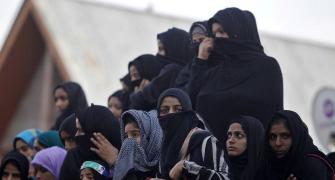
Notwithstanding the Opposition stalling the passage of the contentious triple talaq bill, the government is set to push for its nod in the Rajya Sabha in the budget session, asserting that it is committed to it.
Briefing reporters at the conclusion of the winter session, parliamentary affairs minister Ananth Kumar also attacked the Congress, which had not opposed the bill in Lok Sabha but voiced its strong opposition in the Upper House.
Congress president Rahul Gandhi talks about woman empowerment but "runs away" when it comes to acting on this, Kumar said.
In the Rajya Sabha, the Congress everyday came with an excuse to stall the bill, he alleged.
However, the government is "committed to passing the law and empower our Muslim sisters", Kumar said.
The Muslim Women (Protection of Rights on Marriage) Bill, 2017, which criminalises instant talaq and provides for up to three years of imprisonment for accused Muslim men was passed by the Lower House on December 28.
A united opposition, however, stalled it in the Rajya Sabha with the Congress moving a motion that the bill should be sent to a select committee for further scrutiny, a move strongly opposed by the treasury benches.
When the budget session starts on January 29, the motion, which was moved by senior Congress leader Anand Sharma, will be taken up for consideration.
Government sources said they would seek its passage in the first phase of the session and would be holding talks with opposition parties to arrive at a consensus.
With the government recommending a schedule for the budget session, it is unlikely to bring in an ordinance over the issue and will seek the bill's passage in the next session, official sources said.
Treasury benches had also cited a Supreme Court order, which had invalidated the practise of triple talaq, to push for a law to criminalise the practise.
Law Minister Ravi Shankar Prasad had told the Lok Sabha that the practice of instant triple talaq has continued despite the apex court's order, making it imperative for the government to bring a law.
Image used for representation purpose only.










